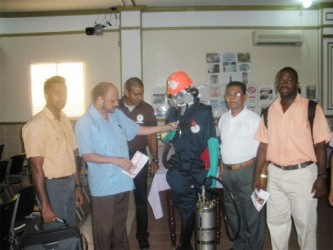Despite significant strides in the fight against the spread of malaria, Vector Control Services faces several difficulties, ignorance by the general public about the disease as well as a shortage of equipment.
“Our population is not very educated when it comes to disease,” VCS Director Reyaud Rahman said at a commemoration of Malaria Day in the Americas on Wednesday evening under the theme “Invest in the Future: Defeat Malaria.”
The commemoration, organised by the VCS under the Ministry of Health at the Regency Suites on Hadfield Street, highlighted the importance of a ceaseless war against the disease.

Rahman pointed out that there is a need for improved advocacy and sensitising of the public to the disease which affects them. According to him, people need to become aware of the signs and symptoms of diseases and how to treat them when they occur.
Karanchand Krishnalall, chief inspector of the VCS, emphasised that the observation of Malaria Day is an important time to recognise the achievements of the programme and the people involved.
The day is also an important time to review and adjust plans to achieve the goals of the programme, he said.
The vector control programme targets all administrative regions of Guyana but focuses primarily on regions 1, 7, 8, and 9. Though malaria has been eliminated on the coast, it is still prevalent in the hinterland.
In Georgetown, though malaria is not an issue, Rahman pointed out that risks of other diseases transmitted by mosquitoes, such as dengue and yellow fevers, are still likely. Hence, the VCS embarks on widespread fogging exercises to alleviate the issue on the coast.
In the Americas, there has been a steady decline in the number of malaria cases for the past decade, with the number falling below 500,000 last year. Deaths have decreased by 17% while the incidences of the disease have decreased by 60%.
Adrianus Vlugman, Guyana’s PAHO/WHO representative, opined that the promising statistics show a call for more investment in the fight against malaria and expressed his organisation’s continued support for VCS’s programme.
Rahman said malaria can only be controlled effectively through the distribution of nets, conducting mass blood surveys, and fogging activities.
In this year alone, the VCS has distributed over 16,000 nets. This figure is apart from the more than 15,000 nets given away to bodies, including the Ministry of Amerindian Affairs, which had received a significant number of nets to provide to Amerindian communities. The VCS has also performed over 50,000 blood smears this year.
Minister of Health Dr Bheri Ramsaran, who was also present at the commemoration, explained that the influx of persons entering the hinterlands both legally and illegally has also made the task of fighting malaria in the area even more difficult. According to Minister Ramsaran, porous borders which are difficult to police have increased the opportunities for disease to spread from place to place and have made the threat more apparent. This threat also requires more resources.
Ramsaran also cautioned the VCS to not become complacent due to their successes and urged interested persons to join the training programme being offered at the Ministry of Health.
VCS plans to embark on many projects and will be conducting a home scope survey to assess the impact of the drugs distributed.
The programme receives funds primarily from the Ministry of Health and collaborates with a number of organisations, including the Guyana Geology and Mines Commission and the Guyana Forestry Commission.
Guyana has been commemorating National Malaria Day since 2003 and proposed the date of November 6th for the Americas, which coincides with the initial discovery of the malaria-causing protozoan organism in 1880.
In October 2007, it was resolved that November 6th will henceforth be observed annually as Malaria Day in the Americas.





